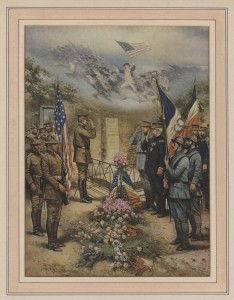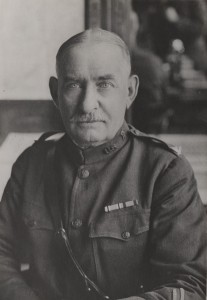Pershing at Picpus
General John J. Pershing (right foreground), commander of the American Expeditionary Force in Europe, at Lafayette’s grave in Picpus Cemetery on July 4, 1917. Colonel Charles E. Stanton, who said “Lafayette, We Are Here” on this occasion, is third from left
Fourth of July in Paris 1917
“The words came like an electric shock.”
– An American who was there.


On the Fourth of July, 1917 all Paris was on tip-toe in the crowded streets, grouped at the windows, huddled together on balconies, and standing on house-tops to catch sight of the newly arrived American soldiers parading on their way to the tomb of Lafayette. They were cheered as “Sammies,” “Yankees,” or “Teddies.” That was a scene for every Parisian to gaze upon and long remember, for the vigorously marching Americans were the first of many thousands to follow, come to fight with the French, the British, and the Belgians against a common foe, the invading Prussian [German] armies, even then but fifty miles away. These United States soldiers were the first ever to go out from their homeland to cross the Atlantic and take part in a European conflict. History was in the making.

